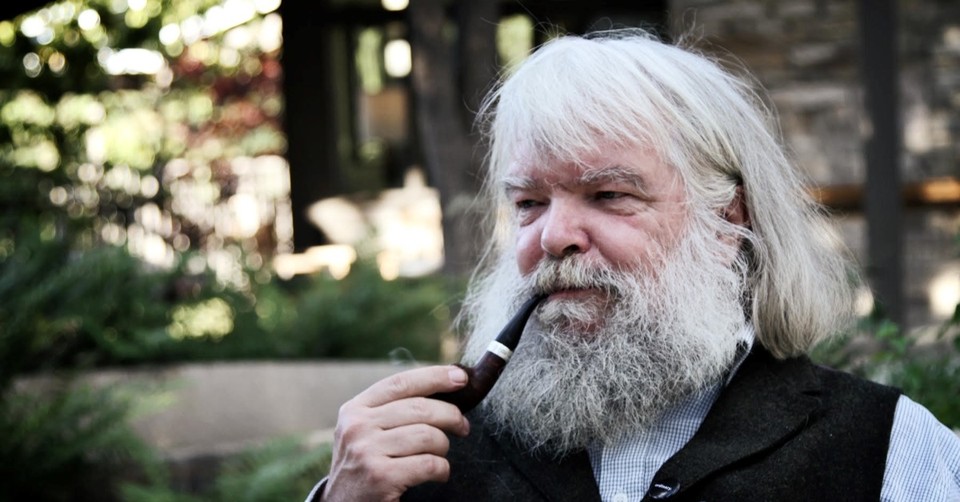What Can Christians Learn from Malcolm Guite's Powerful Poetry?

Malcolm Guite is one of the most celebrated modern Christian poets, inspired by the likes of W.B. Yeats, Seamus Heaney, C.S. Lewis, T.S. Eliot, and George MacDonald. Why do so many readers around the world resonate with Guite’s poetry?
What Kind of Poetry Does Malcolm Guite Write?
Though Guite has written in different poetic forms, the sonnet form is the model he usually adopts. According to some scholars, Italian poet Giacomo da Lentini invented the sonnet. In his books, Guite has used the sonnet form of poetry to explore important themes about doubt, pain, hope, joy, community, art, and the agape love of Christ.
Not only does Guite use poetry for the printed page, but he also explores poetry in music. Guite grew up listening to Bob Dylan, Johnny Cash, Van Morrison, The Beatles, and Led Zepplin. These different musicians and bands have influenced the music of the blues band Mystery Train which Guite belongs to. The band was formed in Cambridgeshire, inspired by R&B, folk, rock, and blues music, and has performed throughout the United Kingdom.
How Did Malcolm Guite Grow Up?
Guite was born in 1957 in Ibadan, Nigeria. His parents were British expatriates living in the country of Nigeria. At this time, Guite’s father was a Methodist preacher and a classics teacher. The family moved to Canada during Guite’s adolescent years. Shortly before he would have entered high school, his parents sent him to a boarding school in Hertfordshire, England. As Guite put it in an interview with Travis Michael Fleming, his parents “felt I was losing my British identity, which is quite funny, because I didn’t really have one.” After a terrible experience at the boarding school, Guite won a scholarship to Pembroke College in Cambridge at 19.
Though Guite grew up learning Christianity from his parents, he described himself as losing his faith during adolescence. The boarding school cruelty played a part in his disillusionment, as did the usual pains and struggles that come with being a teenager. He also grappled with philosophical questions about the reality of suffering and evil and whether there was good experiential evidence for a good and loving God.
Guite became an agnostic, but pursuing these philosophical questions led him to a surprising place. He began exploring poets such as Samuel Taylor Coleridge, John Keats, and C.S. Lewis, finding that these poets posed the same questions and provided solace. He also noticed that many poets he enjoyed believed in a spiritual reality.
Over time, Guite changed his views on the supernatural. During his agnostic period, he believed only in what could be proved empirically—what could be observed and tested. After much resistance, Guite found this worldview had limits and came to believe there was some divine existence. However, he still had to consider what he believed about the divine. Little did he know something else was going to happen which would change his views.
How Did Malcolm Guite Become a Christian?
Though Guite was quite critical of religion, through reading romantic poets such as John Keats and Percy Bysshe Shelley and the ancient Hebrew Psalms, he experienced a spiritual joy that he could not explain away. Poetry brought a new shift in Guite’s life. The power of art helped bring Guite to faith in Christ from agnosticism.
During his last semester at Pembroke College, Cambridge, Guite began to study the Psalms intensely. Finding that the Psalms explored anger, doubt, frustration, and depression, Guite resonated with these poems written thousands of years ago. While coming across Psalm 145 in 1979, Guite became aware of the presence of Christ. Guite recalls in his interview with Fleming, “Suddenly, unequivocally, and undeniably, I was not alone in the room.”
This personal encounter with Christ led to Guite being baptized six months later and an ordained Anglican priest in the Church of England.
While pursuing the priesthood, Guite also pursued his vocation as a poet and teacher. At Durham University, he studied the works of poets like T.S. Eliot and John Donne. Guite found all these poets to be kindred spirits, wrote about them extensively, and taught courses on them.
Guite went on to be a chaplain at Girton College, Cambridge University, where he worked for 17 years before retiring in 2020. Guite currently resides with his wife, Maggie, in England.
What Classic Writers Influence Malcolm Guite’s Poetry?
Guite has discussed many poets who have influenced his work. These poets, listed below, helped Guite immensely on his spiritual journey.
T. S. Eliot, author of The Waste Land and The Four Quartets, greatly impacted Guite’s poetry. Eliot belonged to the twentieth-century modernist movement but was also steeped in Dante, John Milton, John Keats, other poets, the Bible, and world mythologies. Guite found a kindred spirit in Eliot when reading The Waste Land and Four Quartets. These two poems explore themes of doubt and faith.
George Herbert inspired Guite’s book After Prayer: New Sonnets and Other Poems. The book’s beginning includes Herbert’s poem “Prayer,” which explores the mystical conversation between human beings in time and space with the Creator of the universe. Guite found Herbert’s poem to be of great artistic inspiration when he was writing After Prayer, which was published in 2019.
Guite is currently the president of the George MacDonald Society. In his books and Spell in the Library YouTube videos, Guite has discussed how the Scottish preacher inspires and informs his work. Guite was also interviewed in the documentary The Fantasy Makers about MacDonald’s literary legacy.
When Irish writer C.S. Lewis was honored at Westminster Abbey’s Poets Corner in 2013, Guite gave a talk on how Lewis’ poetry impacted his work. Though Lewis was better known for his fiction and Christian apologetics, Guite conveyed the importance of Lewis’ discipline to poetry and the great desire he always had to be a great poet.
The English poet Samuel Taylor Coleridge, author of The Rime of the Ancient Marier, inspired Guite to write a book about Coleridge’s contribution to literature and the classic poem’s themes. Guite’s book, Mariner: A Voyage With Samuel Taylor Coleridge, was published in 2018.
English essayist, lay theologian, and journalist G.K. Chesterton is best known for books like Orthodoxy, The Everlasting Man, and The Man Who Was Thursday. However, Guite suggests that Chesterton’s poetry is also well worth exploring. In his book Waiting On The Word, Guite quotes Chesterton’s poem The Ballad of The White Horse. Drawing on the poem’s ideas, Guite explores the spiritual theme of servanthood. Mechanics, nurses, doctors, counselors, librarians, priests, chaplains, baristas, and booksellers all exemplify servanthood portrayed by Christ in His Incarnation, Death, and Resurrection.
Guite has also discussed J.R.R. Tolkien’s influence on his work. His book The Singing Bowl includes the poem “Patterns (Tree and Leaf),” inspired by seeing a picture of Tolkien and by Tolkien’s book Tree and Leaf. The book also features some of Tolkine’s writings, including the famous “On Fairy Stories,” the short story “Leaf by Niggle,” the poem “Mythopoeia,” and the verse drama “The Homecoming Of Beorhtnoth Beorthelm’s Son.”
How Has Malcolm Guite Informed Inklings Scholarship?
Guite was fascinated with George MacDonald, Lewis, Tolkien (and other members of the Inklings) before his conversion. After his conversion to Christianity, Guite began to study them intensely. These writers inspired Guite to pursue a vocational path to become a poet and a priest. He has also written about them from an academic perspective.
Guite’s scholarly focus on the Inklings is their contribution to poetry and fantasy literature. Guite has contributed essays and poems on these writers to different scholarly publications, including the Journal of Inklings Studies and Sehnsucht. He has also delivered talks and sermons at various C.S. Lewis retreats led by the C.S. Lewis Foundation, the Marion E. Wade Center, the Veritas Forum, and other organizations.
Living Poets That Inspired Guite
The Irish poet Seamus Heaney was a friend of Guite’s. Guite first encountered Heaney’s poetry in 1974. Heaney’s use of poetry to explore transcendental reality, influenced by Greek, Norse, and Irish mythology, inspired Guite as he was finding his own voice as a poet. When Guite learned of Heaney’s death in 2013, he wrote a moving tribute to Heaney, published on his website.
Poet-mythologist Martin Shaw is a friend of Guite’s. Shaw’s fiction and non-fiction have influenced Guite’s understanding of poetry and mythology in the context of the Christian life. Shaw’s website features a fascinating conversation between Shawn and Guite on the correlation between faith, myth, and mythology.
10 Best Books by Malcolm Guite
Guite has written many books, but these
1. After Prayer: New Sonnets and Other Poems
2. Waiting On The Word: A Poem a Day for Advent, Christmas, and Epiphany
3. Sounding the Seasons: Seventy Sonnets for the Christian Year
4. David’s Crown: Sounding the Psalms
5. Lifting the Veil: Imagination and The Kingdom of God
6. The Singing Bowl
7. Mariner: A Voyage With Samuel Taylor Coleridge
8. Heaven in the Ordinary: A Poet’s Corner Collection
9. Parable and Paradox: Sonnets on the Sayings of Jesus and Other Poems
10. Love, Remember: 40 Poems of Loss, Lament, and Hope
Photo Credit: Courtesy of Malcolm Guite.
Justin Wiggins is an author who works and lives in the primitive, majestic, beautiful mountains of North Carolina. He graduated with his Bachelor's in English Literature, with a focus on C.S. Lewis studies, from Montreat College in May 2018. His first book was Surprised by Agape, published by Grant Hudson of Clarendon House Publications. His second book, Surprised By Myth, was co-written with Grant Hudson and published in 2021. Many of his recent books (Marty & Irene, Tír na nÓg, Celtic Twilight, Celtic Song, Ragnarok, Celtic Dawn) are published by Steve Cawte of Impspired.
Wiggins has also had poems and other short pieces published by Clarendon House Publications, Sehnsucht: The C.S. Lewis Journal, and Sweetycat Press. Justin has a great zeal for life, work, community, writing, literature, art, pubs, bookstores, coffee shops, and for England, Scotland, and Ireland.
This article is part of our People of Christianity catalog that features the stories, meaning, and significance of well-known people from the Bible and history. Here are some of the most popular articles for knowing important figures in Christianity:
How Did the Apostle Paul Die?
Who are the Nicolaitans in Revelation?
Who Was Deborah in the Bible?
Who Was Moses in the Bible?
King Solomon's Story in the Bible
Who Was Lot's Wife in the Bible?
Who Was Jezebel in the Bible?
Who Was the Prodigal Son?

Originally published March 15, 2024.





